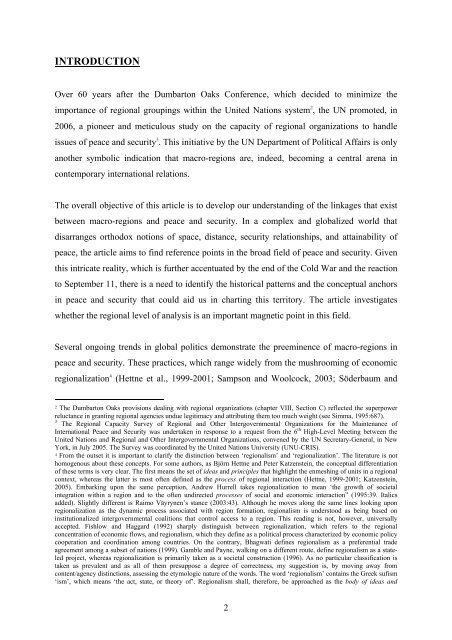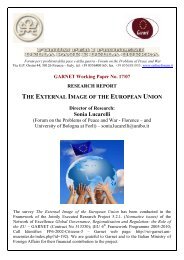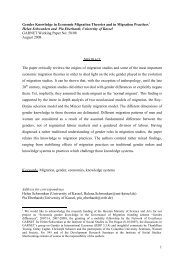GARNET Working Paper No. 13/07
GARNET Working Paper No. 13/07
GARNET Working Paper No. 13/07
You also want an ePaper? Increase the reach of your titles
YUMPU automatically turns print PDFs into web optimized ePapers that Google loves.
INTRODUCTION<br />
Over 60 years after the Dumbarton Oaks Conference, which decided to minimize the<br />
importance of regional groupings within the United Nations system 2 , the UN promoted, in<br />
2006, a pioneer and meticulous study on the capacity of regional organizations to handle<br />
issues of peace and security 3 . This initiative by the UN Department of Political Affairs is only<br />
another symbolic indication that macro-regions are, indeed, becoming a central arena in<br />
contemporary international relations.<br />
The overall objective of this article is to develop our understanding of the linkages that exist<br />
between macro-regions and peace and security. In a complex and globalized world that<br />
disarranges orthodox notions of space, distance, security relationships, and attainability of<br />
peace, the article aims to find reference points in the broad field of peace and security. Given<br />
this intricate reality, which is further accentuated by the end of the Cold War and the reaction<br />
to September 11, there is a need to identify the historical patterns and the conceptual anchors<br />
in peace and security that could aid us in charting this territory. The article investigates<br />
whether the regional level of analysis is an important magnetic point in this field.<br />
Several ongoing trends in global politics demonstrate the preeminence of macro-regions in<br />
peace and security. These practices, which range widely from the mushrooming of economic<br />
regionalization 4 (Hettne et al., 1999-2001; Sampson and Woolcock, 2003; Söderbaum and<br />
2 The Dumbarton Oaks provisions dealing with regional organizations (chapter VIII, Section C) reflected the superpower<br />
reluctance in granting regional agencies undue legitimacy and attributing them too much weight (see Simma, 1995:687).<br />
3 The Regional Capacity Survey of Regional and Other Intergovernmental Organizations for the Maintenance of<br />
International Peace and Security was undertaken in response to a request from the 6 th High-Level Meeting between the<br />
United Nations and Regional and Other Intergovernmental Organizations, convened by the UN Secretary-General, in New<br />
York, in July 2005. The Survey was coordinated by the United Nations University (UNU-CRIS).<br />
4 From the outset it is important to clarify the distinction between ‘regionalism’ and ‘regionalization’. The literature is not<br />
homogenous about these concepts. For some authors, as Björn Hettne and Peter Katzenstein, the conceptual differentiation<br />
of these terms is very clear. The first means the set of ideas and principles that highlight the enmeshing of units in a regional<br />
context, whereas the latter is most often defined as the process of regional interaction (Hettne, 1999-2001; Katzenstein,<br />
2005). Embarking upon the same perception, Andrew Hurrell takes regionalization to mean ‘the growth of societal<br />
integration within a region and to the often undirected processes of social and economic interaction” (1995:39. Italics<br />
added). Slightly different is Raimo Väyrynen’s stance (2003:43). Although he moves along the same lines looking upon<br />
regionalization as the dynamic process associated with region formation, regionalism is understood as being based on<br />
institutionalized intergovernmental coalitions that control access to a region. This reading is not, however, universally<br />
accepted. Fishlow and Haggard (1992) sharply distinguish between regionalization, which refers to the regional<br />
concentration of economic flows, and regionalism, which they define as a political process characterized by economic policy<br />
cooperation and coordination among countries. On the contrary, Bhagwati defines regionalism as a preferential trade<br />
agreement among a subset of nations (1999). Gamble and Payne, walking on a different route, define regionalism as a stateled<br />
project, whereas regionalization is primarily taken as a societal construction (1996). As no particular classification is<br />
taken as prevalent and as all of them presuppose a degree of correctness, my suggestion is, by moving away from<br />
content/agency distinctions, assessing the etymologic nature of the words. The word ‘regionalism’ contains the Greek sufism<br />
‘ism’, which means ‘the act, state, or theory of’. Regionalism shall, therefore, be approached as the body of ideas and<br />
2





